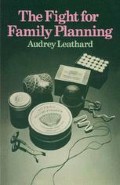Abstract
Marie Stopes (1880–1958) shattered the great public silence on birth control by her spectacular activities. A remarkable woman of intellect, energy and intense ambition, she had become, by 1905, the youngest Doctor of Science in England; the first woman to be appointed a lecturer on the scientific staff of Manchester University; and already awarded a Ph.D. from the University of Munich (1904).1 As her palaeobotanical researches began to yield important results, she became well-known in her own professional field.
Access this chapter
Tax calculation will be finalised at checkout
Purchases are for personal use only
Preview
Unable to display preview. Download preview PDF.
References
K. Briant, Marie Stopes (London: Hogarth Press, 1962) pp. 40–50.
Ibid. p. 80.
Fortieth Annual Report of the Malthusian League (1918) p. 2; Eugenics Review, X, 4 (1919) pp. 236–8.
M. Stocks, ‘Dr Marie Stopes’, Family Planning, 7, 4 (1959) p. 2.
M. Stopes, Married Love, 12th edn. (London: Putnam’s, 1931) p. 129. The sole methods mentioned were vinegar, water and a solution of quinine.
M. Stopes, Wise Parenthood, 12th edn. (London: Putnam’s, 1925) pp. 4357.
Eugenics Review, XI, 2 (1919) pp. 81–2.
I am indebted to Ruth Hall, author of Marie Stopes: A Biography (London: Andre Deutsch, 1977) for this information. Marie Stopes’ earlier biographers, Aylmer Maude and Keith Briant, both state the incorrect figure of L100.
A. Maude, Marie Slopes: Her Work and Play (London: Peter Davies, 1933) p. 140.
M. Stopes, The First Five Thousand (London: Bale & Danielsson, 1925) pp. 13–14.
M. Stopes, Contraception, 2nd edn. (London: Bale & Danielsson, 1929) p. 363.
Hall, Marie Stopes: A Biography.
Lancet, 1 (1921) p. 677; The Malthusian XLV, 4 (1921) p. 28.
M. Jennings of the Daily Mirror, letter to M. Stopes, BML (14 March 1921).
Stopes, Contraception, p. 365; Maude, p. 141; Briant, p. 135.
M. Stopes, clinic papers, BML.
Stopes, The First Five Thousand, p. 23.
‘Contraception’, The Practitioner, CXI, 1 (661) (1923) p. 2.
Briant, p. 143.
Queen’s Hall Meeting on Constructive Birth Control (London: Putnam’s, 1921) pp. 17, 23–5.
Maude, pp. 156–7.
C. P. Blacker, ‘The Confluence of Psychiatry and Demography’, British Journal of Psychiatry, 123, 576 (1973) p. 494.
M. Stocks, Still More Commonplace (London: Peter Davies, 1973) p. 18.
The Malthusian, XLV, 8 (1921) pp. 60–1.
Ibid. p. 60.
Lancet, 2 (1921) p. 1198; BMJ, 2 (1921) p. 817; The Malthusian, XLV, 12 (1921) p. 97.
Mrs N. Wright, personal contact, June 1973.
‘Walworth’, Family Planning, 4, 4 (1956) p. 10; Walworth looks back on fifty years of family planning’, FPA News, 30 (1971) p. 7.
N. Haire, How I Run My Birth Control Clinic (London: Cromer Welfare Clinic, 1929) p. 5.
The New Generation, XIV, 10 (1935) p. 116.
Information given by Ruth Hall, June 1976.
The Malthusian, XLV, 6 (1921) p. 42.
The Malthusian, XLV, 8 (1921) p. 61.
Ibid. p. 61.
M. Stopes, A New Gospel To All Peoples (London: Humphreys, 1922) pp. 6, 26–7.
The Lambeth Conferences (1867–1948) (London: S.P.C.K., 1948) p. 50.
‘Lambeth and the Ethics of Sex’, The Challenge, XIV, 356 (1921) pp. 246–7.
W. R. Inge, Diary of a Dean: St. Paul’s 1911–1934 (London: Hutchinson, 1949) p. 60; The Bishop of Birmingham. Inge, Diary of a Dean: St. Paul’s 1911–1934 (London: Hutchinson, 1949) p. 60; The Bishop of Birmingham, ‘The Lambeth Conference’, in D. Williamson (ed.), The Daily Mail Year Book for 1921 (London: Associated Newspapers, 1920) pp. 36–7; 43rd Annual Report of the Malthusian League (1921) p. 2.
F. Watson, Dawson of Penn (London: Chatto & Windus, 1951) pp. 55–60.
Lord Dawson of Penn, Love-Marriage-Birth Control (London: Nisbet, 1922) p. 21.
Sunday Express, 16 October 1921.
The Malthusian, XLV, 11 (1921) p. 86.
J. Peel and M. Potts, Textbook of Contraceptive Practice (Cambridge: Cambridge University Press, 1969) p. 9.
The Malthusian, XLV, 5 (1921) p. 33.
Copyright information
© 1980 Audrey Leathard
About this chapter
Cite this chapter
Leathard, A. (1980). The First Clinics. In: The Fight for Family Planning. Palgrave Macmillan, London. https://doi.org/10.1007/978-1-349-04451-1_2
Download citation
DOI: https://doi.org/10.1007/978-1-349-04451-1_2
Publisher Name: Palgrave Macmillan, London
Print ISBN: 978-1-349-04453-5
Online ISBN: 978-1-349-04451-1
eBook Packages: Palgrave Social & Cultural Studies CollectionSocial Sciences (R0)

